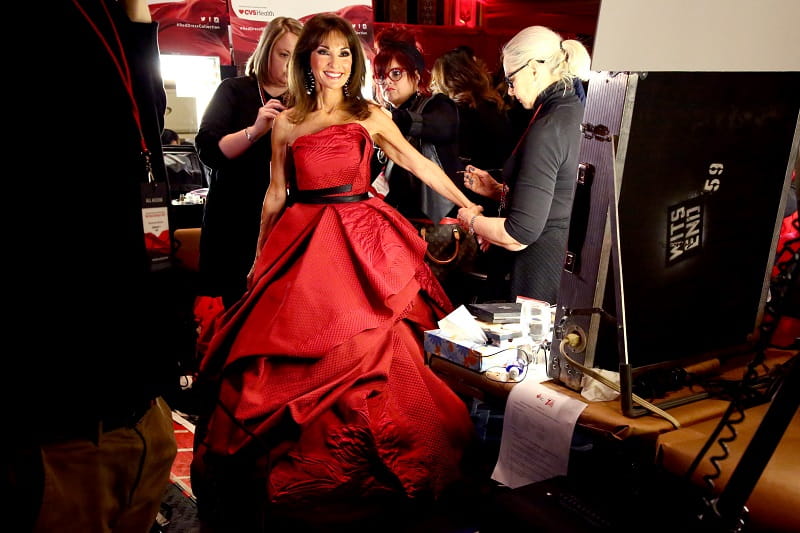Take it from Susan Lucci: Prioritize your health
By Nancy Brown, American Heart Association CEO

Around noon the day after two stents were inserted into her heart, Susan Lucci came home from the hospital, went upstairs to her bedroom and changed clothes. She walked out ready to attend a lunch celebrating a friend's birthday.
Her son, Andreas Huber, had driven to Long Island from Manhattan to check on her. Seeing her come downstairs dressed for an outing, Andreas said, "Mom, what are you doing?"
Susan was doing what she'd always done.
At 71, she was a healthy, active woman with a packed calendar, personally and professionally. She had a commitment, so she was going to fulfill it.
Her son's reaction provided the reality check she needed. And part of the reason Susan is sharing the story of her heart episode is to provide a reality check for others.
While her primary aim is drawing attention to the warning signs of heart disease and the need to get medical care right away, this day-after scene encapsulates two more key messages she wants to relate:
– the importance of women prioritizing their own health, and
– the emotional stages a person must go through to get comfortable with becoming a survivor.
"Mom," Andreas said, "nobody would fault you for not showing up at the birthday party."
Susan relented. She changed into a robe and rested that afternoon, beginning what was essentially the first day of the rest of her life – her new life as someone who'd narrowly avoided the type of heart attack known as the "widow maker."
The day before, Susan had been buying her friend's birthday present when she felt a tightening in her chest that radiated around her rib cage to her back. She'd experienced a similar, milder sensation twice in the previous two weeks. This time it was more intense.
Likening it to "an elephant pressing on my chest," Susan remembered hearing a woman use those words to describe the start of her heart attack. Fearing the same, Susan went straight to the hospital. Doctors found a nearly 90 percent blockage in the artery that supplies most of the blood to her heart. A 75 percent blockage was found in another artery. She underwent an emergency procedure that restored full blood flow in both damaged arteries.
Thanks in part to her remarkable fitness, Susan headed home the next morning. As her husband drove, Susan looked out the window at the streets of Garden City, New York, the town where she grew up and lives to this day.
"My goodness," she thought. "I feel like I haven't seen these trees or the sky in the longest time."
Only later would she realize she was seeing the world through a new lens – the fresh perspective of someone coming to grips with the notion they might have never again seen the trees or sky.
While it might seem trite to compare the emotional recovery from her potentially fatal problem to dealing with the end of "All My Children," there was some overlap.

In her autobiography, Susan wrote that leaving daytime TV brought on "sadness and disbelief and some anger." Those were among the swirl of feelings that overcame her following her fateful day in late October.
"It shakes your confidence in your health," she said.
Susan's internist and cardiologist told her that was typical. They said it might take three months to process what happened. That's about how long it took.
"It was really more in my mind, taking it a step at a time," she said. "I would say to my husband that I was fine. I just had to believe that I was fine."
Although Susan skipped that birthday lunch – her husband, by the way, delivered the gift while she stayed home with Andreas – and she dropped out of a movie she was supposed to film in Bulgaria weeks later, she resumed much of her routine.
Just two days after being discharged from the hospital, she performed in the play, "Celebrity Autobiography," reading passages from the works of Elizabeth Taylor and Ivana Trump. That appearance was at Stony Brook University. She continued that role in four performances on Broadway over November and December. She also continued her nearly daily workouts.
"I wasn't afraid to get out of bed, and I wasn't afraid to go back onto my Pilates chair, but I will say that I didn't go right to the full workout right away," she said. "That just seemed reasonable, sensible to do it that way."
Susan got into Pilates back in the 1970s. That prompted her to clean up her diet, trading cheeseburgers and tacos for a Mediterranean diet heavy on salads and fish. She considered these changes good for her health, good for her career – and good for her family. After all, the healthier and more vibrant she was, the more she could do for her husband, children and, now, grandchildren.
In other words, prioritizing her health is smart, not selfish. However, she fears that far too many women are reluctant to do the same.
"As women, we're not on our own to-do list," she said. "We are nurturing others. That's what we do, and we have places to go and people to see, and we don't think we can fit it into our schedules. What I'm saying is listen to your symptoms, and don't be afraid that you are overreacting or taking any doctor's precious time. If you think something needs medical attention, pay attention and go to the doctor. Go to the hospital."
While Susan revealed her story publicly last week, she's shared it with friends since it happened. Those who know her best – who've seen her devotion to exercise and a clean diet – worried for their own health. Several went for checkups; fortunately, all got good reports.
With the tension eased, friendly teasing about her favorite meals followed.
"We are never having kale salad again," one pal joked.
Said her husband: "You need to go right for cheeseburgers now!"
Susan smiled while telling that anecdote. She then added one more piece of advice: Having fun with friends and family is wonderful medicine for everyone's heart and soul.
"Laughter," she said, "is very good for you."

A version of this column also appeared on Thrive Global.
If you have questions or comments about this story, please email [email protected].





